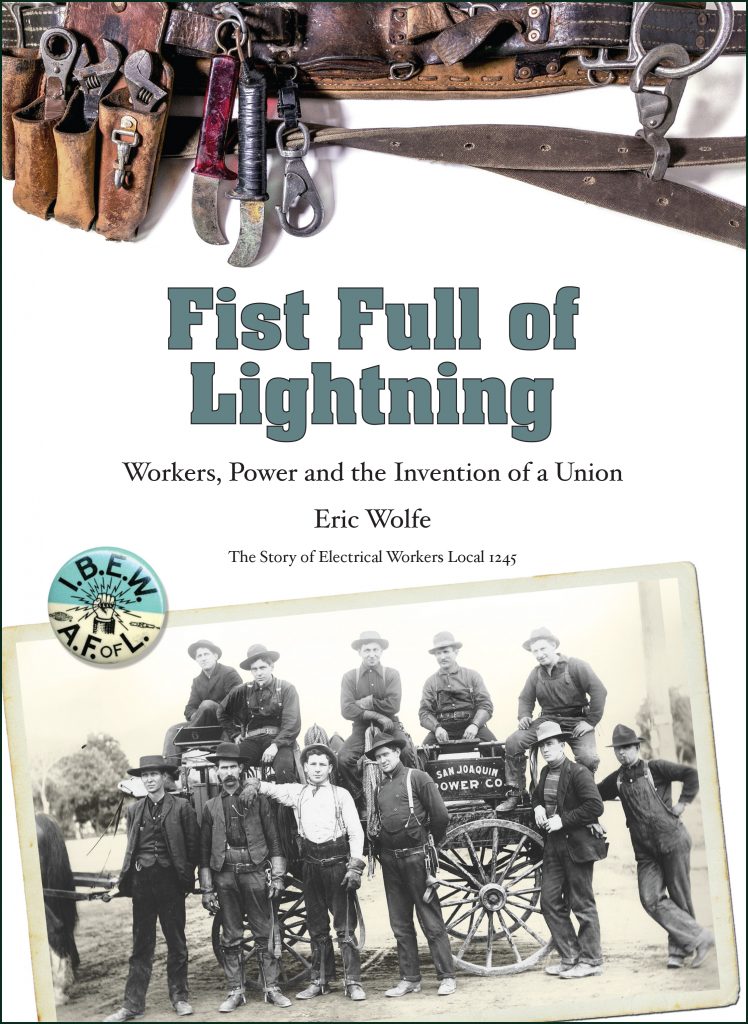Where did IBEW Local 1245 come from?
New research has revealed that utility workers in San Francisco were in the forefront of some of the most explosive industrial uprisings of the early 20th century, when western linemen confronted giant utilities like United Railroads, Pacific Gas & Electric, and Pacific Telephone and Telegraph. Their story, largely unknown until now, has been revealed in the just-published Fist Full of Lightning: Workers, Power and the Invention of a Union.
 “It took incredible courage to start a union back then. The only way to get the utilities’ attention was to strike and that could get you shot,” said author Eric Wolfe, IBEW 1245’s communications director since 1990.
“It took incredible courage to start a union back then. The only way to get the utilities’ attention was to strike and that could get you shot,” said author Eric Wolfe, IBEW 1245’s communications director since 1990.
The book offers graphic descriptions of several IBEW inspired utility strikes that shook the West Coast, including street car strikes in 1906 and 1907, the PG&E strike of 1913, and strikes against PT&T in 1917 and 1919 in support of telephone operators trying to organize. The story continues with the rise of a new industrial union movement at PG&E led by Ronald Weakley in the 1940s that finally forced PG&E to the bargaining table. Wolfe then explores how Weakley fashioned IBEW 1245 into a labor powerhouse, which today represents workers at 72 employers and over 200 contractors.
Fist Full of Lightning, now available for mail order, has captured the attention of labor historians and activists for its dramatic narrative style.
“I love this book,” said Howard Kling, president of the International Labor Communications Association. “It’s a real page-turner full of drama, insight and substance that artfully paints the big story of the US labor movement within the fascinating history of electrical linemen organizing for power in the Bay Area of California.”
“Through the history of IBEW Local 1245, Wolfe deftly explores the tensions and themes that have been part of the union movement from the beginning, probing the practical boundaries of class consciousness, solidarity, business unionism and compromise that are still questions today. 1245’s parent at the turn of the 20th Century, Local 151, emerges as a terrifically militant and successful union that upheld the principle of solidarity at all cost, until the cost was its very existence. For a long while their own fights with the powerful California electric utilities merged with striking streetcar workers, the ‘hello girls’ of the telephone company, and other electricians to change the social and economic landscape of the Bay Area.
“And after the demise of Local 151, IBEW 1245 itself arises from the same fights … Time and again Wolfe shows us how organized linemen were important players in the battle over the soul of organized labor and the fight between craft and industrial unionism.
“Wolfe’s account is fun, readable and important,” said Kling.
Carl Wood, a long-time organizer for the Utility Workers Union and a former commissioner of the California Public Utilities Commission, called Fist Full of Lightning a “fascinating history of an important union,” praising it as “thoroughly researched, fast-paced and eminently readable” and “a valuable contribution to the history of the Bay Area and the US labor movement.”
The book contains many rare photographs of Bay Area utility workers in the early days of the industry, tracks their many battles through the 20th century, and brings the story right up to the present with the IBEW 1245’s new initiative to create “Brotherhood without Borders” by assisting linemen in the South American country of Suriname.
David Moberg, senior editor and chief labor writer for In These Times, said that Fist Full of Lightning “ultimately provides not only an important contribution to the history of working Americans but also food for thought about the challenges workers continue to face in a changing society.”
IBEW 1245 arose because utility workers dared to stand up for their rights. Fist Full of Lightning tells their story.